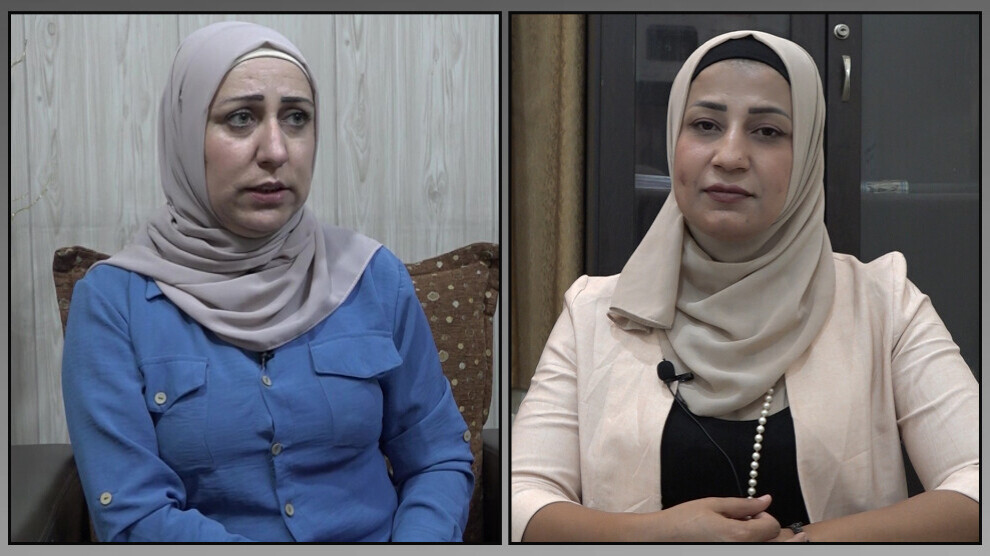Manbij Cries Out for Its Memory… The Martyrs’ Shrines Become a New Target of Turkish Attacks
The canton that liberated itself from ISIS now faces a new assault on the symbols of its sacrifice by the Turkish occupation, amid international silence and legal criticism describing the attacks on the shrines as crimes against humanity.

Asma Mohammed
Qamishlo - Lawyer Ghufran Khalaf and Deputy Head of the Women’s Authority Nargis Youssef affirm that the targeting of the Martyrs’ Shrine in occupied Manbij constitutes a serious violation of the sanctity of cemeteries and human values. They call on local and international human rights organizations to take immediate action to hold Turkey’s mercenaries accountable and stop the repeated assaults on the canton’s collective memory.
Occupied Manbij, a city that bled to be reborn and wrote its freedom with the blood of its sons when it was liberated from ISIS in August 2016, now faces a new wound after the attack on its Martyrs’ Shrine - the fourth such incident. The assault was not merely on stone or symbols, but on the memory of a city that resisted terrorism and sacrificed its best youth for freedom and dignity.
Manbij, located east of Aleppo, is one of the most prominent cities in the North and East Syria region due to its ethnic and social diversity. During the war, it became a battleground: it broke away from the former Syrian regime’s control in 2012, then fell under ISIS rule in 2014, before being liberated by the Syrian Democratic Forces after fierce battles. Nine years after liberation, the canton has faced repeated attacks by Turkish-backed mercenaries - the latest of which destroyed parts of the Martyrs’ Shrine, sparking widespread outrage. Many considered the act a violation of the community’s dignity and its struggle against ISIS.
Violations Targeting the Martyrs’ Shrine in Manbij
Lawyer Ghufran Khalaf stressed that the violations committed by Turkish mercenaries in Manbij represent a blatant breach of law and the sanctity of graves and shrines, describing them as legal crimes that could be prosecuted. She emphasized that the recurrence of such acts poses a major legal challenge and that these are not isolated incidents but deliberate violations that demand accountability.
She explained, “Institutions responsible for protecting public property and shrines must give utmost importance to filing legal cases against the factions involved and investigating those who issued orders to destroy cemeteries and violate the martyrs’ sanctuaries - martyrs who hold a sacred status for having sacrificed their lives for freedom and the protection of society.”
Khalaf noted that “the violations can be documented, as the perpetrators have publicly shared video footage of their acts, which allows for evidence gathering and legal prosecution both locally and internationally. These acts violate Syrian law, the laws of the Autonomous Administration, and the Social Contract that guarantees protection of property for all, regardless of affiliation.”
She criticized the international community’s silence toward these violations, considering it a result of intertwined interests with the Turkish state — an indirect breach of international humanitarian and legal responsibilities. She called on human rights and legal organizations, whether officially recognized or not, to take active steps to confront these violations. She emphasized that attacking the sanctity of martyrs and cemeteries is above all a humanitarian issue and urged the global community to set aside political interests and assume its moral duty to hold the perpetrators accountable.
In conclusion, Khalaf made an appeal “to everyone with a human and legal conscience to help document violations in the territories occupied by Turkey’s mercenaries.” She affirmed that documentation is the cornerstone of accountability and that justice, though it may be delayed, is inevitable: “Every effort in this field strengthens the protection of our society’s values, the dignity of our martyrs, and the rights of future generations. Documentation is a vital step toward achieving justice and preventing the perpetrators from escaping punishment.”
“Targeting the Shrines Is an Assault on National and Moral Values”
Nargis Youssef, Deputy Head of the Women’s Authority in Qamishlo, North and East Syria, stated that the recent attack on the Martyrs’ Shrine in Manbij is part of a broader series of assaults carried out by mercenaries in the canton. She stressed that this was not merely an attack on a historical site but an assault on the community’s values and principles, as the shrines carry deep spiritual significance for the martyrs and their families - serving as symbols of their sacrifices for land, freedom, and human dignity.
Youssef explained that targeting the Martyrs’ Shrines reveals the barbaric mindset of Turkey’s mercenaries, who seek to instill fear and erase human dignity and free thought. She confirmed that these factions attack everything sacred — from martyrs’ shrines to places of worship - aiming to impose extremist ideologies intolerant of cultural and ethical diversity.
She added that such assaults are not new, citing previous attacks on shrines in Serekaniye/Ras al-Ain and on mosques. The recent aggressions in Manbij, she noted, are part of a systematic campaign targeting the region’s thought and culture.
Youssef further stated, “The martyrs who gave their lives defending their land and principles embody the sacrifices of both women and men.” She emphasized that “targeting the shrines affects women in particular - mothers and wives who have already endured the pain of loss are now wounded again by these violations.” She considered these attacks an attempt to erase the community’s cultural and spiritual identity.
She concluded by affirming her intent to expose these violations through media coverage and raise awareness of the crimes committed against civilians and heritage sites. She urged human rights and humanitarian organizations to document these crimes and ensure that those responsible are held accountable both legally and morally:
“Documenting these violations is essential to preserving the national and human legacy of the martyrs. They embody the community’s values and principles - and through them, the path of freedom and dignity will continue.”
